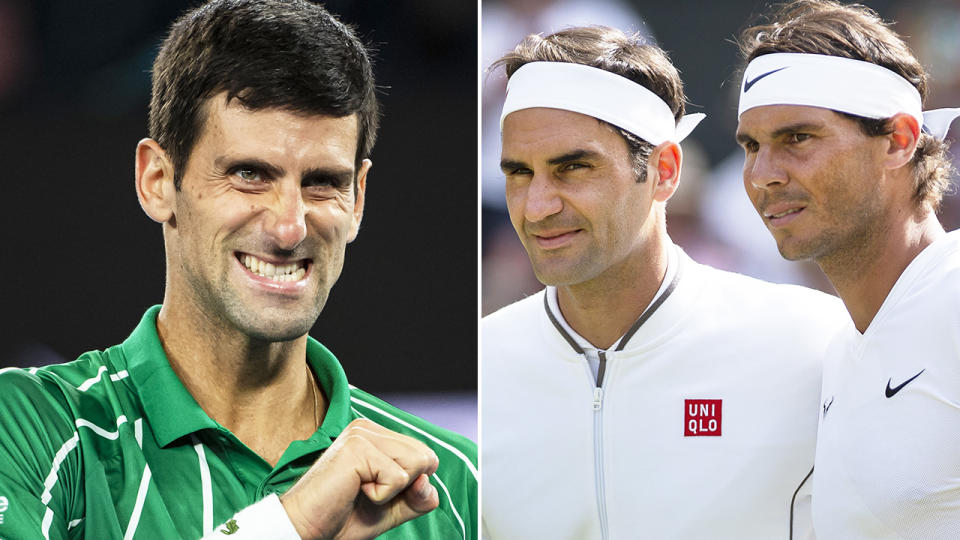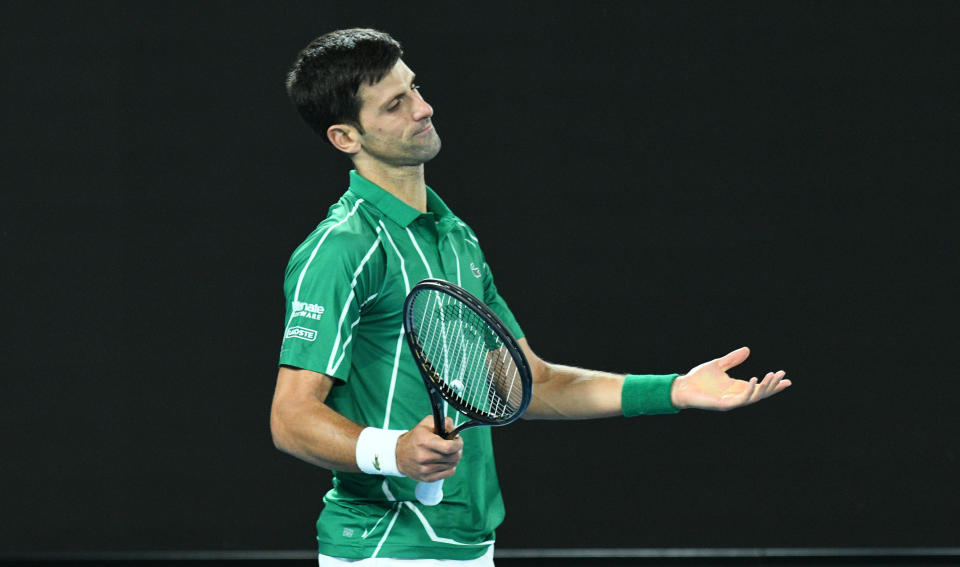'Needs to be liked': Novak Djokovic's Federer and Nadal problem

From growing up with NATO bombs raining down on Serbia to securing his place amongst the Grand Slam greats, Novak Djokovic never fails to both divide and unite.
The 33-year-old world number one has seemingly everything he needs.
TRADING BARBS: Kyrgios slams Djokovic's father’s 'shameful' virus claim
'SCEPTICISM OF SCIENCE': Djokovic family’s conspiracy theories
Seventeen Grand Slam titles is just three behind the all-time record of Roger Federer who is five years older.
He boasts $143 million in prize money alone.
Despite his achievements, however, Djokovic appears doomed never to be held in the same saintly esteem as Federer or Rafael Nadal, the undisputed 'people's champions' of tennis.
There are those that see something a little more calculating in the Djokovic make-up, an intense, brooding presence prone to affectation and fads and a little too 'new age' for most tastes.
Nick Kyrgios described the Serb's post-victory "cup of love" gesture as "cringeworthy".
Never short of an opinion, the Australian also accused Djokovic of desperately needing to be liked.
Kyrgios drove the knife in further this week when he branded Djokovic's ill-advised Adria Tour, which has seen the Serb test positive for coronavirus, as "bone-headed".
All had seemed set fair for Djokovic this year before the lockdown in March.
He had secured a record eighth Australian Open and was on an 18-0 winning streak.
But in the space of three months, his character and reputation have come crashing down.
Novak Djokovic’s COVID-19 blunders
First of all, he was criticised for breaking lockdown rules to train in Spain.
He then invited derision for insisting emotions can change the quality of water while almost simultaneously insisting that he would not be prepared to vaccinate against the coronavirus.
When he described limits on players' entourages at the US Open as "extreme" and "impossible", Djokovic found himself in the crosshairs again for being entitled in a world and sport trying to pull together.
His backing of the Adria Tour in Belgrade and then Croatia, which has seen a raft of players as well as his own wife test positive for the virus, is for many the final straw.
As president of the ATP Player Council, it is, for his critics, conduct unbecoming.
However, few can doubt Djokovic's resolve.
Prayers up to all the players that have contracted Covid - 19. Don’t @ me for anything I’ve done that has been ‘irresponsible’ or classified as ‘stupidity’ - this takes the cake. https://t.co/lVligELgID
— Nicholas Kyrgios (@NickKyrgios) June 23, 2020
Djokovic’s mental strength tested
Two years ago, his career was in the doldrums.
Unable to shake off the lingering effects of elbow surgery, he suffered a shock early exit at 2018 Roland Garros.
With his ranking outside the top 20 for the first time in 12 years, Djokovic threatened to skip Wimbledon.
He changed his mind and with his career suddenly rejuvenated, he swept to a fourth title at the All England Club.
That was swiftly followed by more triumphs at the US and Australian Opens.
Only an inspired Dominic Thiem at the French Open in 2019 prevented him becoming just the second man in history to hold all four Slams at the same time on two occasions.
No matter, just weeks later, he captured a fifth Wimbledon in a record five-set final against Federer, saving two championship points in the process.
"Novak has everything to make records in this sport," said fellow player Juan Martin del Potro.

Djokovic captured the first of his 17 majors at the Australian Open in 2008, but it was three years before he added his second.
He dropped gluten from his diet, his lithe physique allowing him to chase down lost causes, transforming him into the rubber man of tennis.
After leading Serbia to a maiden Davis Cup in 2010, he raced through the first half of 2011, building up a 48-1 winning run.
Only a semi-final defeat at the French Open prevented him from becoming just the third man to capture a calendar Grand Slam.
Despite that, he still finished 2011 with a 70-6 win-loss record, a haul of 10 tournament victories and year-end number one for the first time.
Back-to-back Australian Opens followed in 2012 and 2013, although the French Open remained frustratingly out of reach with three heart-breaking losses until his 2016 breakthrough.
In Paris that year, he became the first player to break through the $100 million barrier in prize money.
The year before, he won 11 titles and compiled a win-loss record of 82-6.
Legacy driving Novak Djokovic
Off court, Djokovic married long-time girlfriend and high school sweetheart Jelena Ristic in July 2014.
They have two children, a son Stefan and daughter Tara.
But on the court, his role as pantomime villain seems destined to leave him typecast.
"It doesn't mean that fans hate me and it certainly doesn't mean that I need to turn Serbia against the rest of the world just because fewer people support me in Grand Slam finals," he said.
When the All England Club crowd was noisily willing on Federer in last year's Wimbledon final, Djokovic turned the adversity in his favour.
"When they chanted 'Roger, Roger' I willed myself into believing they were chanting 'Novak, Novak'," he said.

